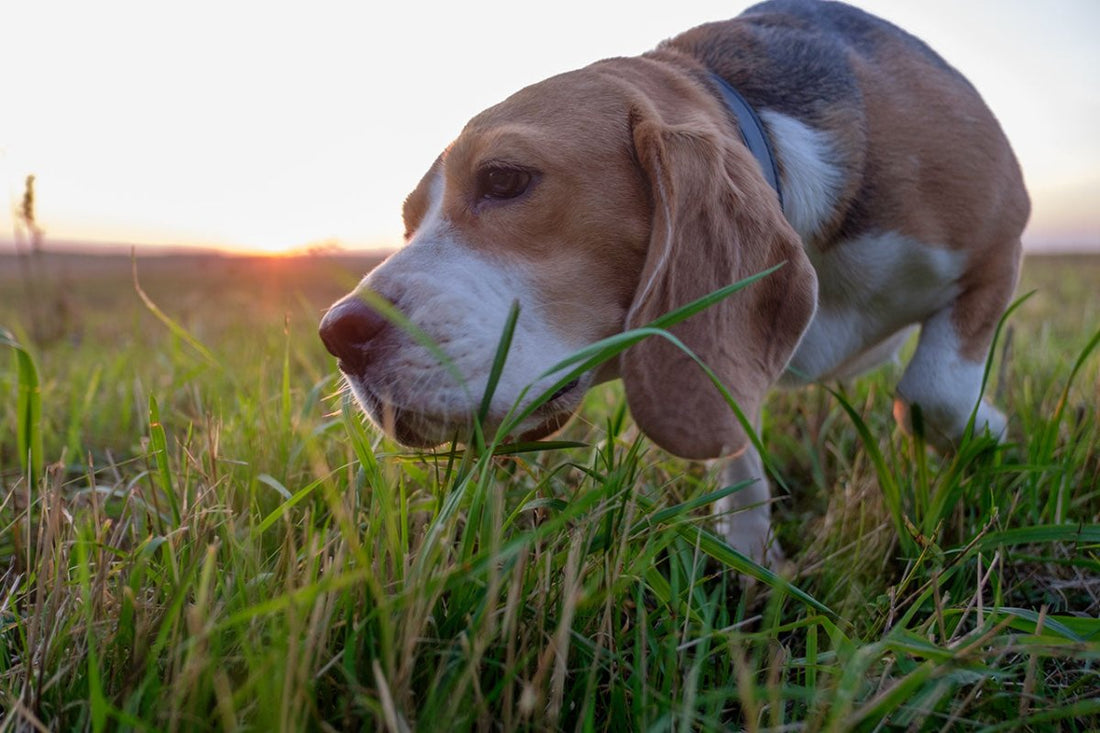Almost every dog owner has probably asked themselves this question at some point. Should you be worried if your dog eats grass or is it harmless? As there are many reasons why dogs eat grass, there is unfortunately no general answer to this question - as is often the case. But we will take a closer look at the topic.
Eating grass because it tastes good
In fact, dogs sometimes nibble on blades of grass simply because they taste good. Young grass in spring in particular contains sugary substances that taste slightly sweet. Dogs that simply nibble on one or two blades of grass often do so in a relaxed and enjoyable manner.
Natural support of the gastrointestinal tract
Domestic and wild dogs, as well as wolves, occasionally instinctively eat plant material. Grass contains a high proportion of fiber and is therefore largely indigestible for dogs. The blades of grass therefore pass through the digestive tract almost undigested. This process supports digestion, promotes intestinal movement and helps with the digestion of meat and other animal parts.
If you want to support your four-legged friend's digestion, you should make sure that you feed him enough fiber. For example, psyllium husks very good.
Eating grass due to nutrient deficiency?
Grass contains some nutrients such as vitamins and minerals that dogs can absorb. However, since they are present in small quantities and are hardly usable by the dog due to indigestibility, they do not contribute significantly to the dog's diet.
When does grass eating become a problem?
Eating grass is not necessarily a cause for concern, but it can be an indication of a digestive problem.
In particular, if the dog eats grass excessively, hectically, often and in large quantities, this can be a sign of discomfort and gastrointestinal problems. Gastrointestinal problems can also have a variety of causes, such as hyperacidity, gallbladder problems, inflammation of the stomach lining (gastritis) or foreign bodies. If you suspect this, a visit to the vet is advisable.
Individual nutritional advice can also be useful.
Some dogs vomit after eating grass. This is often thought to be a self-cleaning mechanism, although not all dogs that eat grass necessarily vomit.
By the way, you can elm bark support your dog's stomach lining and calm. The powder boiled with water turns into a slimy syrup that forms a protective film over the stomach lining and can relieve your dog's discomfort.
Grass Eating – When the Cause Is in the Head
Eating grass can also simply be a sign of boredom or a way for dogs to relieve stress. Stress, fear and frustration can lead to displacement activities in dogs, which can also manifest as grass eating.
Furthermore, our dogs are very smart and capable of learning, which means that eating grass can also be a way for the dog to get attention. In these cases, the dog has simply learned that eating grass will get him attention from his owner.
Good to know:
One or two dog owners will be familiar with this: the undigested blades of grass come out the back in the same way they were ingested at the front and get stuck in the anus when defecating.
However, if you want to help your four-legged friend, you should be careful. Since blades of grass can have sharp edges, you could cause your dog small, painful cuts.
Conclusion – It is individual
Grass eating in dogs is usually not a cause for concern as long as it is occasional and not excessive. However, if your dog is eating grass very frequently or in large quantities and may even be experiencing other symptoms, this could indicate a health problem.
This should then be clarified by a veterinarian. If medical causes are ruled out, a dog trainer may be able to help.
We at alphazoo want to support you and your pet in all situations and offer you our help. We support the stomach and the digestion of your four-legged friend!



